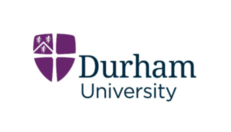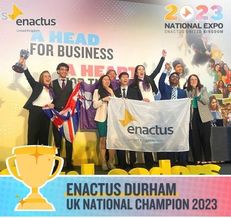Summary
Enactus is a network of student leaders committed to using business as a catalyst for positive social and environmental impact. Students take the lead to educate, inspire and support young people to use innovation and entrepreneurship to solve the world’s biggest problems. Enactus currently has 1,626 projects across 33 countries and 2,064 campus programmes.
Enactus Durham is a student-led society that delivers social enterprise projects, regionally, across the Northeast of England, and internationally. Enactus currently has 210 members from across all faculties, working on 5 active projects, covering 11 of the UN Sustainable Development Goals. Rachel Bickerdike, the Enterprise Manager in Durham University’s Venture Lab Team, is the University Adviser for Enactus Durham. She supports the team in developing projects, using industry-standard start-up tools (such as the Lean Business Canvas) to ensure that they are producing sustainable business models for their projects. She also offers one-to-one support to develop the team’s leadership skills.
On April 4th 2023, Enactus Durham were crowned “UK Champions” at the Enactus UK National Expo, a national competition that has been running since 2001. Enactus operates in over 55 Universities across the UK and Durham University was selected as a Top 5 team to compete in the final. The final competition included last year’s champions, and the Durham University team won ahead of the other four university teams, celebrating a well-deserved success in front of an audience of over 900 supporters. Having been awarded the UK title of best team, Durham University students will now represent the UK at the Enactus World Cup in Utrecht in October 2023. Enactus Durham’s position as UK Champions puts them in the top 35 teams in the world.
Enactus Durham presented two of their projects to win first place: Taka Taka Zero and The Ugly Fruit Group.
Taka Taka Zero is a community-led waste-to-energy project empowering clean, self-sufficient communities in the informal settlements of Nairobi. They use a “community cooker” to incinerate no-value waste and generate thermal energy for cooking and heating water, providing meals for the local community. The cooker has 85% combustion efficiency, producing pure CO2 that is 80 times less harmful for the environment than the methane that the waste would otherwise release. Since August 2022, the team has empowered 30 young people in the Mathare settlement to enter the workforce, with waste-management training, teamworking skills and providing remuneration above the minimum wage. Enactus has also educated local school children about waste management and urban agriculture by building a garden space.
The Ugly Fruit Group is a project focused on decreasing food waste and food insecurity in the UK. Members of the group regularly collect fruit and vegetables destined for landfill from two local retailers, donating 90% of it to 2 local food banks. The remaining 10% is used to make unique jams and preserves, which are then sold locally. Any profit is re-invested into the schools outreach programme and running interactive workshops about food waste with children in local primary schools in Durham.
In addition to Taka Taka and Ugly Fruit Group, the team currently has three other projects:
- Glowcycle – supporting previously incarcerated women in Durham into meaningful employment.
- WeCraft – combatting loneliness and lack of creative outlets in the local community.
- Trashion – a commercial project, designing new fashion pieces from general waste and waste clothing products, generating income to support the other projects.
Outline the 3 key benefits of integrating this theme:
Enactus Durham offers a unique opportunity for students to engage with the Sustainable Development Goals, by encouraging them to think about the impact of the goals on communities around the world and locally.
Students of the society are encouraged to address problems faced by communities, and to generate feasible solutions that have a positive impact on beneficiaries. The projects improves key skills around enterprise development and fundraising, they enable students to develop general employability skills (such as critical thinking and team working) and demonstrate that their work makes a difference for others.
The Enactus programme develops the next generation of impactful leaders with a distinct awareness of the SDGs, through linking awareness and engagement of the goals and their targets with business development skills. Students at Durham University are excelling in this area and have proven that impact can be achieved through small changes.
Outline the barriers or challenges encountered in integrating this theme and how you overcame these:
In the summer of 2022, most students of the Enactus team were graduating from Durham University and the society faced the challenges of recruiting new members to the executive team. The University Adviser, Rachel Bickerdike, worked intensively with the team at the time to develop an effective recruitment campaign highlighting the key benefits of joining Enactus (e.g. skills development and the opportunity to have impact on the Sustainable Development Goals’ implementation).
It was through the University’s Game Changer programme (UN SDG Good Practice) that the new president, Jude Fursland, was identified – having shown that he was passionate about having an impact on the SDGs and developing new business ideas to combat some of the problems identified.
Jude Fursland has been the driving force of Enactus Durham for the 2022/23 academic year and has led the projects to achieving high impact for beneficiaries, achieving a place in the National Finals and ultimately becoming UK National Champions.
In the space of a year, the team has gone from virtually no members to over 200 participants.






 Except where otherwise stated, content on this site is
licensed under a Creative Commons Attribution 3.0 License.
Except where otherwise stated, content on this site is
licensed under a Creative Commons Attribution 3.0 License.
